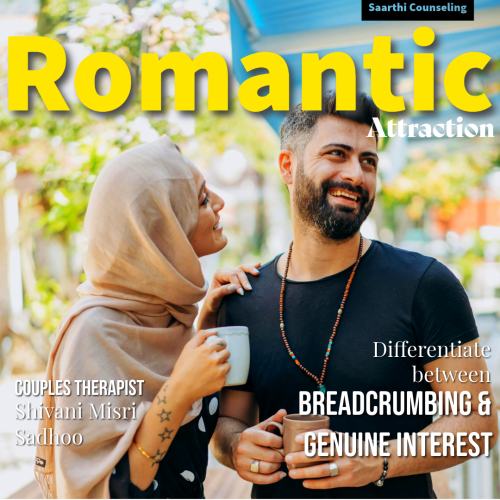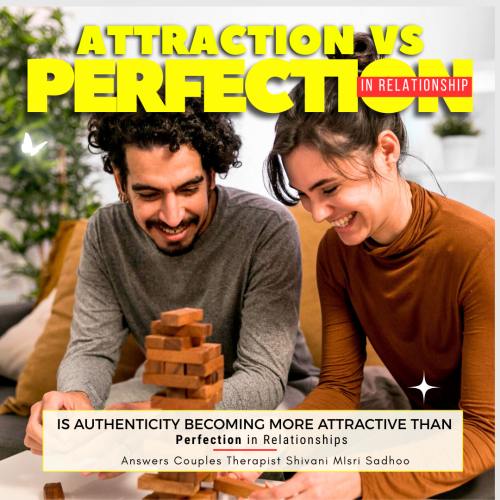In today’s digital dating and relationship landscape, mixed signals have become almost normal. One day, you receive sweet messages or compliments, and the next day, there is silence. This confusing pattern often leaves people wondering whether someone is genuinely interested or merely using them for attention. This is where the concept of breadcrumbing comes in. Understanding the difference between breadcrumbing and genuine interest is essential for protecting your emotional well-being and building healthy connections, according to Shivani Misri Sadhoo, one of Delhi’s top relationship and marriage counsellors.
What Is Breadcrumbing?
Breadcrumbing is a relationship behaviour where a person gives you small, inconsistent bits of attention to keep you emotionally invested, without any real intention of committing or moving the relationship forward. The term comes from the idea of leaving “breadcrumbs” — just enough to keep you following, but never enough to satisfy your needs.
This behaviour is common in dating apps, friendships, and even workplace or social relationships. A breadcrumber may send occasional texts, react to your social media posts, or check in randomly, especially when they sense you are pulling away. However, they avoid deeper conversations, plans, or emotional availability.
How Does Breadcrumbing Typically Look?
Breadcrumbing often follows a predictable pattern. The person may:
- Text or call only when it suits them
- Disappear for days or weeks without explanation
- Avoid making concrete plans or cancel them repeatedly
- Offer vague promises like “we’ll meet soon” without action
- Show interest only when you seem less available
The key characteristic is inconsistency. Their attention comes in waves, leaving you confused and constantly waiting for more.
Why People Breadcrumb?
People breadcrumbs for different reasons. Some enjoy the validation and ego boost of knowing someone is interested in them. Others may be emotionally unavailable, afraid of commitment, or keeping multiple options open. In some cases, they may not even realise the emotional impact of their behaviour, but that does not make it any less harmful.
Breadcrumbing allows the other person to stay in control while investing minimal effort.
What Genuine Interest Looks Like?
Genuine interest, on the other hand, feels very different. It is consistent, respectful, and reassuring. Someone who is genuinely interested in you makes an effort to be part of your life, not just an occasional presence in it.
Signs of genuine interest include:
- Regular and consistent communication
- Making and following through on plans
- Showing curiosity about your life, feelings, and goals
- Being emotionally present and responsive
- Clear intentions rather than vague promises
With genuine interest, you are not left guessing. Even if the relationship is moving slowly, the effort and direction are clear.
Key Differences Between Breadcrumbing and Genuine Interest
Understanding the contrast between breadcrumbing and genuine interest becomes much easier when you look at specific behaviours. Below are clear, real-life examples that highlight how the two differ.
1. Communication Style
Breadcrumbing: Communication is sporadic and unpredictable. You may receive a sudden “Hey, what’s up?” after days of silence, with no real conversation or follow-up. Messages often lack depth and disappear once they have your attention.
Genuine Interest: Communication is consistent and intentional. Even during busy periods, the person makes an effort to check in, explain delays, and maintain a sense of connection.
2. Effort and Follow-Through
Breadcrumbing: Plans are vague and frequently postponed. Statements like “Let’s meet someday” or “We should catch up soon” are repeated but never acted upon.
Genuine Interest: Plans are specific and honored. If something comes up, they reschedule rather than disappear, showing that spending time with you matters.
3. Emotional Availability
Breadcrumbing: Emotional depth is avoided. Conversations stay light or surface-level, especially when you try to discuss feelings, expectations, or the future.
Genuine Interest: Emotional openness is present. The person listens, shares their thoughts, and is willing to have honest conversations, even if they feel uncomfortable at times.
4. Accountability and Respect
Breadcrumbing: Disappearances go unexplained. When questioned, the person may deflect, minimise your feelings, or suggest you are overreacting.
Genuine Interest: Accountability is taken seriously. They acknowledge mistakes, apologise when needed, and make changes to avoid repeating the same behaviour.
5. Impact on Your Emotional Well-Being
Breadcrumbing: You often feel anxious, confused, or insecure, constantly questioning where you stand.
Genuine Interest: You feel calm, valued, and secure, knowing where you stand even if the relationship is still developing.
6. Long-Term Intentions
Breadcrumbing: There is no clear direction. The connection remains stuck in the same place with no progress over time.
Genuine Interest: There is forward movement. The person expresses intentions through actions, showing a desire to grow the relationship naturally.
These differences make it clear that genuine interest provides clarity and emotional safety, while breadcrumbing thrives on uncertainty and minimal effort.

How to Protect Yourself?
The best way to deal with breadcrumbing is to set clear boundaries. Notice patterns instead of excuses. Communicate your expectations calmly and observe how the other person responds. Genuine interest will meet your clarity with respect, while breadcrumbing often fades or becomes defensive when confronted.
Remember, consistency is more important than intensity. Someone who truly cares will show up in actions, not just words.
Breadcrumbing and genuine interest can look similar at first, but over time, their differences become clear. You deserve relationships where effort matches words and interest is shown through consistency. Trust patterns, trust your feelings, and do not settle for crumbs when you deserve a full connection.

















